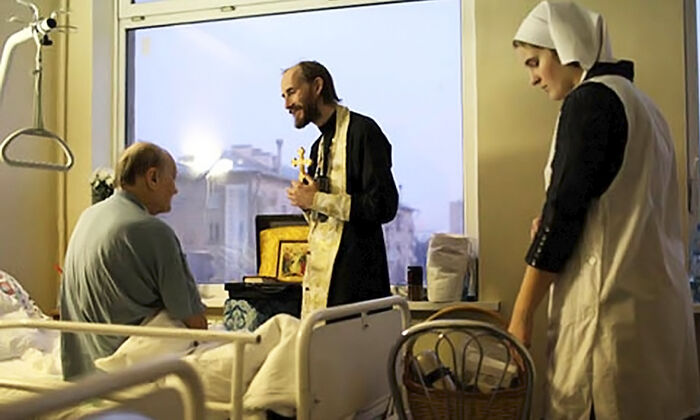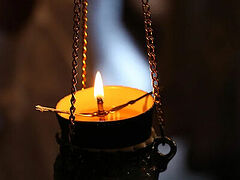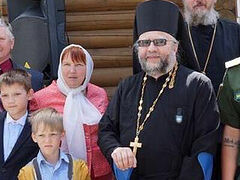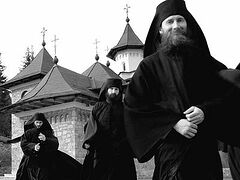A man was receiving Communion at the hospital. During the sacrament his fellow patient sleeping in the next bed woke up. He asked me to make the sign of the cross over him. “But I don’t have any money,” he said.
Lord, have mercy! What money can we talk of when a suffering image of God is in front of you? It turned out that he was deaf; he confessed in writing and took Communion—I carry a spare particle of the Holy Gifts with me. He wearing only trousers—he didn’t even have a T-shirt. It’s a strange story: He undressed before his procedure, and afterwards, the T-shirt was gone. So what? He starts every day at the hospital without a T-shirt with the prayer: “Glory to Thee, O Lord, for the night and for the day.” A man without a T-shirt thanks God and does not lose heart. This is how it happens in life: we notice what we don’t have, and we don’t see what we have. He had trousers and a very, very grateful life.
Away with gloom! There is no place for it in the Christian heart. One of the New Martyrs had a cow, the only remaining provider for his large family, and was seized by the authorities. He tdhen invited his wife to a prayer service, saying, “Dear, let’s go and thank God.”
Hieromartyr Kirill (Smirnov), Metropolitan of Kazan and Sviyazhsk, used to catch fish with a tin can in exile, and when they were being transported under guard he made fellow believers play checkers so that the devil of despondency would not find anything in common with them.
How should we live in order to live? Erich Fromm, a German philosopher of the last century, wrote a wonderful book, To Have or to Be. So the first thing that must be understood is that the only thing we will take with us is our deeds—good or evil ones. We will have to leave everything else sooner or later. That’s why it’s really only worth being upset when we lose the good in our souls, and not things stored in our barns. Because then we will become poor before God, and not before people.
When the streets of Paris were teeming with hungry White Russian emigres who led a dog’s life, the future Martyr Maria (Skobtsova) wandered through French markets collecting rotten cabbage leaves to feed the starving people. At the same time, she would run with her daughter to exterminate cockroaches in the homes of French people in order to make both ends meet with her children. Then she went to the gas chamber at a German concentration camp instead of a woman who was not ready to die. To attain eternal salvation you need to prepare your heart. And for this we need grace, not material wealth. To ask for this grace of love for those who, like feel bad like you, and sometimes even worse than you.
It was noon in Kiev when Alexei Glagolev (1901–1972; a future archpriest), a friend of the writer Mikhail Bulgakov and the son of Hieromartyr Alexander Glagolev (1872–1937; an archpriest and a learned theologian who knew twelve languages), was walking through Kiev with a cross from the blown-up church of his father. The “Young Pioneers” were already hooting, spitting, and throwing stones, and he was carrying the cross, knowing that the holy faith must be confessed. There is no fire without witnessing to the faith, without a spiritual labor. He would become a famous priest and would always prevail in disputes with atheists. Once an atheist whom he had beaten in an argument said, “We get rid of you all.” But Fr. Alexei answered meekly, “Today and, perhaps, tomorrow belongs to you, but eternity belongs to us.”
Life is inspired by life. Let us recall how the holy martyred Empress Alexandra of Rome was inspired by the spiritual feat of Great-Martyr George the Victorious; how Nestor was inspired by the instructions of Great-Martyr Demetrius of Thessaloniki; and how the young Origen wrote in a letter to his father, the future Martyr Leonid, imprisoned for Christ: “Father, don’t betray us—suffer for Christ.”
The breadwinner of his family, a priest and a loving husband was taken away into the unknown. It was during the cold years of Soviet persecution. the wife made the sign of the cross over her husband with the words, “Go and suffer for Christ.”
There are many superficial things and a deep “cultural layer” in our lives. Sometimes in order to get to the core, to what is really “the only thing needful” (cf. Lk. 10:42), God takes a “shovel” and “digs” to the heart, then takes the tools of an archaeologist—a “brush” and “toothpicks”—and then there will be “polishing”. It is hard to call on us to live by something deep, something real. We all want something superficial, but God needs the poor in spirit, the meek, the pure in heart, the merciful, they which are persecuted for righteousness’ sake. He wants to call them “blessed”; He wants to say: Rejoice, and be exceeding glad: for great is your reward in Heaven (Mt. 5:3–12).
Hieromartyr Anatoly (Grisyuk; 1880–1938), Metropolitan of Odessa, Professor of Church History at the Kiev Theological Academy and rector of the Kazan Theological Academy, said in one of his letters: “In these days we are not studying history, we are creating it.” He was one of the first to be tortured in prison in the early 1920s—several of his ribs were broken and his health was undermined forever. A conscious understanding of the fact that trials are the most important part of life is what writes our Heavenly history, gives us the right to live on and live forever.
Priest-Martyr Anatoly Zhurakovsky (1897–1937) was taken into the darkness at night after his church was closed, and it was unknown to where. A few months later he wrote lines in a letter confirming the victory of God on earth—in prison the wings of those who had seemed to be skeptics grew. And after many years of exile he called on his entire community, those who until recently had been persecutors or indifferent to Christ, but had finally seen Light and Joy in God: “For Christ, persecuted in the squares of a world at war with Him, we want to create a corner where He would not be a strange Guest, but where everything would always and completely belong to Him, where everything would be permeated with His rays, everything would shine with His Name and be filled with His grace… Until then I will not be at peace, until then my joy will not be perfect, until then I will not say my ‘now lettest Thou Thy servant depart in peace’—until I feel that in the heart of each of you the partitions that separate the Church and its world from life, feast days from working days, and service to God from ordinary work have collapsed completely.”
In the Church we become related to God and to each other. This becomes higher than kindred joy, higher than earthly love, and ultimately higher than earthly life. Only before this mystery could Priest-Martyr Anatoly write the following lines: “By this mystery, by this radiant fragrant news, by this foretaste, by this expectation I live, breathe, rejoice in my loneliness, in my unquenchable sorrow for the orphaned, beloved church, for the abandoned ministry... and for the sake of this news and this mystery I am ready to give up my joy, my youth, my freedom and my life.”
Great things are done in humdrum working days. God will live in an ordinary person when he opens his heart to Him. You can’t be with God if you think about how to have something other than God, and consider it something equally important with Him. In the end, we will take only our deeds with us to eternity. And the most important meeting is one that takes place daily in our hearts.
The Prophet Isaiah said, If ye will not believe, surely ye shall not be established (Is. 7:9). One of the names of God is “God Almighty.” The saints draw strength from Him. He is the Source of Life. We will go to Him, too.





